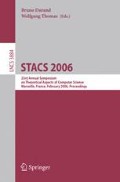Abstract
We show that, from a topological point of view, 2-tape Büchi automata have the same accepting power than Turing machines equipped with a Büchi acceptance condition. In particular, for every non null recursive ordinal α, there exist some Σ\(^{\rm 0}_{\alpha}\)-complete and some Π\(^{\rm 0}_{\alpha}\)-complete infinitary rational relations accepted by 2-tape Büchi automata. This surprising result gives answers to questions of Simonnet [Sim92] and of Lescow and Thomas [Tho90, LT94].
Access this chapter
Tax calculation will be finalised at checkout
Purchases are for personal use only
Preview
Unable to display preview. Download preview PDF.
References
Barzdinand, Y.M., Trakhtenbrot, B.A.: Finite Automata, Behaviour and Synthesis, Nauka, Moscow, 1970 (English translation). North Holland, Amsterdam (1973)
Bal, M.-P., Carton, O.: Determinization of Transducers over Infinite Words. In: Welzl, E., Montanari, U., Rolim, J.D.P. (eds.) ICALP 2000. LNCS, vol. 1853, pp. 561–570. Springer, Heidelberg (2000)
Béal, M.-P., Carton, O., Prieur, C., Sakarovitch, J.: Squaring Transducers: An Efficient Procedure for Deciding Functionality and Sequentiality. Theoretical Computer Science 292(1), 45–63 (2003)
Berstel, J.: Transductions and Context Free Languages. Teubner Verlag (1979)
Büchi, J.R.: On a Decision Method in Restricted Second Order Arithmetic, Logic Methodology and Philosophy of Science. In: Proc. 1960 Int. Congr., pp. 1–11. Stanford University Press (1962)
Cachat, T., Duparc, J., Thomas, W.: Solving Pushdown Games with a Σ3 Winning Condition. In: Bradfield, J.C. (ed.) CSL 2002 and EACSL 2002. LNCS, vol. 2471, pp. 322–336. Springer, Heidelberg (2002)
Choffrut, C.: Une Caractérisation des Fonctions Séquentielles et des Fonctions Sous-Séquentielles en tant que Relations Rationnelles. Theoretical Computer Science 5, 325–338 (1977)
Choffrut, C., Grigorieff, S.: Uniformization of Rational Relations. In: Karhumki, J., Maurer, H., Paun, G., Rozenberg, G. (eds.) Jewels are Forever 1999, pp. 59–71. Springer, Heidelberg (1999)
Engelfriet, J., Hoogeboom, H.J.: X-automata on ω-Words. Theoretical Computer Science 110, 1–51 (1993)
Finkel, O.: On the Topological Complexity of Infinitary Rational Relations. RAIRO-Theoretical Informatics and Applications 37(2), 105–113 (2003)
Finkel, O.: Undecidability of Topological and Arithmetical Properties of Infinitary Rational Relations. RAIRO-Theoretical Informatics and Applications 37(2), 115–126 (2003)
Finkel, O.: On Infinitary Rational Relations and Borel Sets. In: Calude, C.S., Dinneen, M.J., Vajnovszki, V. (eds.) DMTCS 2003. LNCS, vol. 2731, pp. 155–167. Springer, Heidelberg (2003)
Finkel, O.: On Infinitary Rational Relations and the Borel Hierarchy, submitted to Logical Methods in Computer Science, 27 pages
Finkel, O.: Borel Ranks and Wadge Degrees of Context Free ω-Languages. In: Cooper, S.B., Löwe, B., Torenvliet, L. (eds.) CiE 2005. LNCS, vol. 3526, pp. 129–138. Springer, Heidelberg (2005)
Finkel, O.: Borel Ranks and Wadge Degrees of Context Free ω-Languages. In: Cooper, S.B., Löwe, B., Torenvliet, L. (eds.) CiE 2005. LNCS, vol. 3526, pp. 129–138. Springer, Heidelberg (2005)
Gire, F.: Relations Rationnelles Infinitaires, Thèse de troisième cycle, Université Paris 7 (Septembre 1981)
Gire, F.: Une Extension aux Mots Infinis de la Notion de Transduction Rationnelle. In: 6th GI Conf. Lect. Notes in Comp. Sci, vol. 145, pp. 123–139 (1983)
Gire, F., Nivat, M.: Relations Rationnelles Infinitaires, Calcolo, vol. XXI, pp. 91–125 (1984)
Kechris, A.S.: Classical Descriptive Set Theory. Springer, Heidelberg (1995)
Kechris, A.S., Marker, D., Sami, R.L.: \(\Pi_1^1\) Borel Sets. The Journal of Symbolic Logic 54(3), 915–920 (1989)
Kuratowski, K.: Topology. Academic Press, New York (1966)
Landweber, L.H.: Decision Problems for ω-Automata. Math. Syst. Theory 3(4), 376–384 (1969)
Lescow, H., Thomas, W.: Logical Specifications of Infinite Computations. In: de Bakker, J.W., de Roever, W.-P., Rozenberg, G. (eds.) REX 1993. LNCS, vol. 803, pp. 583–621. Springer, Heidelberg (1994)
Lindner, R., Staiger, L.: Algebraische Codierungstheorie - Theorie der Sequentiellen Codierungen. Akademie-Verlag, Berlin (1977)
Moschovakis, Y.N.: Descriptive Set Theory. North-Holland, Amsterdam (1980)
Perrin, D., Pin, J.-E.: Infinite Words, Automata, Semigroups, Logic and Games. Pure and Applied Mathematics, vol. 141. Elsevier, Amsterdam (2004)
Pin, J.-E.: Logic, Semigroups and Automata on Words. Annals of Mathematics and Artificial Intelligence 16, 343–384 (1996)
Prieur, C.: Fonctions Rationnelles de Mots Infinis et Continuité, Thèse de Doctorat, Université Paris 7, Octobre (2000)
Simonnet, P.: Automates et Théorie Descriptive, Thèse de Doctorat, Université Paris 7 (March 1992)
Staiger, L.: Hierarchies of Recursive ω-Languages. Jour. Inform. Process. Cybernetics EIK 22(5/6), 219–241 (1986)
Staiger, L.: ω-Languages. In: Rozenberg, G., Salomaa, A. (eds.) Chapter of the Handbook of Formal languages, vol. 3, Springer, Berlin
Staiger, L., Wagner, K.: Rekursive Folgenmengen I. Z. Math Logik Grundlag. Math. 24, 523–538 (1978)
Thomas, W.: Automata and Quantifier Hierarchies. In: Pin, J.E. (ed.) LITP 1988. LNCS, vol. 386, pp. 104–119. Springer, Heidelberg (1989)
Thomas, W.: Automata on Infinite Objects. In: Van Leeuwen, J. (ed.) Handbook of Theoretical Computer Science, vol. B, pp. 133–191. Elsevier, Amsterdam (1990)
Author information
Authors and Affiliations
Editor information
Editors and Affiliations
Rights and permissions
Copyright information
© 2006 Springer-Verlag Berlin Heidelberg
About this paper
Cite this paper
Finkel, O. (2006). On the Accepting Power of 2-Tape Büchi Automata. In: Durand, B., Thomas, W. (eds) STACS 2006. STACS 2006. Lecture Notes in Computer Science, vol 3884. Springer, Berlin, Heidelberg. https://doi.org/10.1007/11672142_24
Download citation
DOI: https://doi.org/10.1007/11672142_24
Publisher Name: Springer, Berlin, Heidelberg
Print ISBN: 978-3-540-32301-3
Online ISBN: 978-3-540-32288-7
eBook Packages: Computer ScienceComputer Science (R0)

